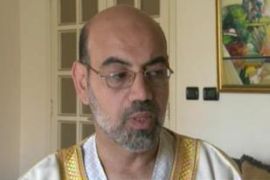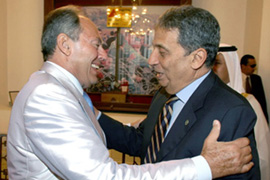Lebanon ceasefire talks progress
Mediators are hopeful of a deal to end fighting at the Nahr al-Bared camp.

Fighting between Fatah al-Islam and the Lebanese army at the Nahr al-Bared camp has killed at least 163 people, including scores of civilians.
Details considered
Al-Hajj said a meeting with the army was expected “to fix the details of setting up [a] force” which would protect about 2,000 refugees still inside the camp.
The finalisation of a truce would enable public access to the camp after the clearance of live cluster munitions used by the army.
|
“We are expecting a ceasefire as soon as possible because we have felt an absolute and positive attitude from Fatah al-Islam” Mohammed al-Hajj, Palestine Scholars Association |
He refused to give Al Jazeera more details about the plan until they are submitted to the seven-party Palestinian committee and Lebanese army leaders.
“We are expecting a ceasefire as soon as possible because we have felt an absolute and positive attitude from Fatah al-Islam group,” al-Hajj said.
A Palestinian political source said on Tuesday a plan to end the fighting included the disbandment of Fatah al-Islam and the deployment of a security force drawn from mainstream Palestinian factions.
As the mediation effort continued on Wednesday, bursts of automatic gunfire could be heard at the camp during intermittent skirmishes.
The Lebanese army has taken control of an area previously controlled by Fatah al-Islam fighters without entering the camp’s official boundaries, mindful of a 1969 agreement which forbids the entrance of the army into Palestinian refugee camps.
Mediators said nothing had been heard for several days from Shaker al-Abssi, the leader of Fatah al-Islam.
Reports that al-Abssi has been killed inside the camp have not been confirmed by Fatah al-Islam.
League talks
 |
| Moussa, right, met the Lebanese president on the second day of his trip [AFP] |
Meanwhile, Amr Moussa, secretary-general of the Arab League, held a second day of talks with Lebanese leaders aimed at bringing together groups from the parliamentary majority with the opposition.
“There are difficulties, but they are not insurmountable,” Moussa said after meeting Emile Lahoud, Lebanon’s president.
“There must be a political solution and measures that bring an end to insecurity.”
Discord between Lebanon’s parliamentary majority and the Hezbollah-led opposition has been at its most serious since last November, when members of the Shia party quit the Western-backed government.
Hezbollah and its allies, Amal and Free Patriotic Movement, seek greater representation in the cabinet, which would give them an effective veto over cabinet decisions.